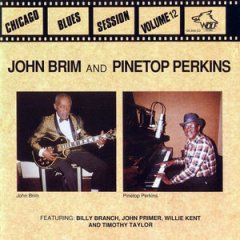John Brim Pinetop Perkins - Chicago Blues Session Vol.12 [1998]
John Brim Pinetop Perkins - Chicago Blues Session Vol.12 [1998]

01 - I'm Gonna Let You Go
02 - Take It Easy Baby
03 - Let Me Hold You
04 - High Heel Sneakers
05 - Driving Wheel
06 - Naptown
07 - Going Down Slow
08 - Call Me Easy Papa
09 - How Long
10 - You Put The Heart On Me
11 - Movin' Out
Billy Branch - Harmonica
Grace Brim - Drums
John Brim - Guitar, Vocals, Performer
John Primer - Guitar
Pinetop Perkins - Piano, Vocals, Performer
Willie Kent - Bass (Electric)
John Brim may be best-known for writing and cutting the original "Ice Cream Man" that David Lee Roth and Van Halen covered on their first album. That's a pity, for the seriously under-recorded Brim made some exceptionally hard-nosed waxings.
Brim picked up his early guitar licks from the 78s of Tampa Red and Big Bill Broonzy before venturing first to Indianapolis in 1941 and Chicago four years later. He met his wife Grace in 1947; fortuitously, she was a capable drummer who played on several of John's records. In fact, she was the vocalist on a 1950 single for Detroit-based Fortune Records that signaled the beginning of her hubby's discography.
John recorded for Random, JOB, Al Benson's Parrot logo (the socially aware "Tough Times"), and Chess ("Rattlesnake," his answer to Big Mama Thornton's "Hound Dog," was pulled from the shelves by Chess for fear of a plagiarism suit). Cut in 1953, the suggestive "Ice Cream Man" had to wait until 1969 to enjoy a very belated release. Brim's last Chess single, "I Would Hate to See You Go," was waxed in 1956 with a stellar combo consisting of harpist Little Walter, guitarist Robert Jr. Lockwood, bassist Willie Dixon, and drummer Fred Below (clearly, Chess had high hopes for Brim, but to no avail).
After a hiatus of a few decades, Brim made a welcome return to studio action with a set for Tone-Cool Records, The Ice Cream Man. Brim, who lived in Gary, IN, remained active on the Chicago blues scene until his passing on October 1, 2003 at the age of 81. ---Bill Dahl, Rovi
He admittedly wasn't the originator of the seminal piano piece "Pinetop's Boogie Woogie," but it's a safe bet that more people associate it nowadays with Pinetop Perkins than with the man who devised it in the first place, Clarence "Pinetop" Smith. Although it seems as though he was around Chicago forever, the Mississippi native actually got a relatively late start on his path to Windy City immortality. It was only when Muddy Waters took him on to replace Otis Spann in 1969 that Perkins' rolling mastery of the ivories began to assume outsized proportions.
Perkins began his blues existence primarily as a guitarist, but a mid-'40s encounter with an outraged chorus girl toting a knife at a Helena, Arkansas nightspot left him with severed tendons in his left arm. That dashed his guitar aspirations, but Joe Willie Perkins came back strong from the injury, concentrating solely on piano from that point on. Perkins had traveled to Helena with Robert Nighthawk in 1943, playing with the elegant slide guitarist on Nighthawk's KFFA radio program. Perkins soon switched over to rival Sonny Boy Williamson's beloved King Biscuit Time radio show in Helena, where he remained for an extended period. Perkins accompanied Nighthawk on a 1950 session for the Chess brothers that produced "Jackson Town Gal," but Chicago couldn't hold him at the time.
Nighthawk disciple Earl Hooker recruited Perkins during the early '50s. They hit the road, pausing at Sam Phillips' studios in Memphis long enough for Perkins to wax his first version of "Pinetop's Boogie Woogie" in 1953. He settled in downstate Illinois for a spell, then relocated to Chicago. Music gradually was relegated to the back burner until Hooker coaxed him into working on an LP for Arhoolie in 1968. When Spann split from Muddy Waters, the stage was set for Pinetop Perkins' re-emergence.
After more than a decade with the Man, Perkins and his bandmates left en masse to form the Legendary Blues Band. Their early Rounder albums (Life of Ease, Red Hot 'n' Blue) prominently spotlighted Perkins' rippling 88s and rich vocals. He had previously waxed an album for the French Black & Blue logo in 1976 and four fine cuts for Alligator's Living Chicago Blues anthologies in 1978. Finally, in 1988, he cut his first domestic album for Blind Pig, After Hours. After that, Pinetop Perkins made up for precious lost time in the studio. Discs for Antone's, Omega (Portrait of a Delta Bluesman, a solo outing that includes fascinating interview segments), Deluge, Earwig, and several other firms ensured that his boogie legacy wouldn't be forgotten in the decades to come. In 2010 he collaborated with harmonica whiz Willie "Big Eyes" Smith for the album Joined at the Hip, which won a Grammy for Best Traditional Blues Album, giving Perkins the status of oldest Grammy winner ever. On March 21, 2011, just over a month after the award ceremony, the legendary bluesman died from a heart attack at his home in Austin, Texas. Pinetop Perkins was 97 years old. ---Bill Dahl, allmusic.com
download (mp3 @320 kbs):
yandex mediafire ulozto solidfiles global-files
Last Updated (Sunday, 07 March 2021 21:45)








